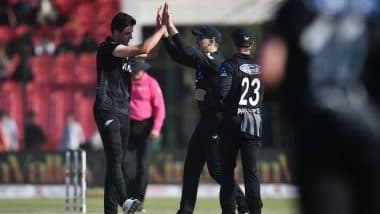Islamabad, March 16: A district court judge in Pakistan said on Thursday he would halt attempts by the Islamabad police to arrest Imran Khan in a corruption case if the ousted premier surrendered before the court.
Additional District and Sessions Judge Zafar Iqbal said this during the hearing of the Election Commission of Pakistan (ECP) case seeking criminal proceedings against Pakistan Tehreek-e-Insaf (PTI) party chief for hiding details of Toshakhana gifts. Toshakhna Case: Islamabad Police Reaches Lahore To Arrest Former Pakistan PM Imran Khan.
The judge had re-issued non-bailable arrest warrants for 70-year-old Khan on February 28 and directed the capital city police to bring him to court by March 18. While hearing the case, the judge remarked that Khan should surrender unconditionally before seeking any favour from the court.
Khan's counsel presented the undertaking as per directions of the Islamabad High Court (IHC) that his client would appear in the court on March 18. The judge remarked what was the meaning of the undertaking if the former premier was not present.
“We want Imran to come to court. Why is he not coming? What is the reason? Imran Khan has to assist the police according to the law, not resist them,” he said. Khawaja Haris, Khan's lawyer, clarified that he wanted to give an undertaking to appear in court on March 18. Pakistan: Imran Khan Asks Party To Continue Struggle Even if He Is Killed or Jailed As Scuffle Breaks Out Between Police, His Supporters (Watch Video).
The judge stated that he would prevent the Islamabad police from arresting Khan if he surrendered in court. “Legally, Imran should have been directly brought to court… it wouldn't have been possible to harass him during the court appearance,” the judge said.
He said there was no need for police to sit outside Khan's residence if he had appeared before the court and also said that being a poor country, Pakistan cannot afford to waste its resources on such matters. He said if Khan had appeared before the court, the arrest warrants would have been cancelled.
Khan's lawyers requested that the non-bailable arrest warrants for him be forthwith cancelled.
The judge issued notices to the secretariat police and ECP and summoned them to court. Earlier, the judge had issued non-bailable arrest warrants for Khan and instructed the police to present him in court. Khan managed to dodge the arrest and later approached the Islamabad High Court (IHC) for the cancellation of the warrants.
The IHC, while granting some relief to Khan, had told him to appear in the sessions court by March 13, but the former prime minister once again skipped the hearing. Judge Iqbal on Monday re-issued non-bailable arrest warrants for Khan and directed the police to bring him to court by March 18.
However, when the police reached Khan's Zaman Park residence in Lahore to arrest him on Tuesday, they were met with resistance, leading to two-day pitched battles between PTI supporters and law enforcement agencies. The clashes ultimately subsided after the courts intervened on Wednesday.
Khan was ousted from power in April last year after losing a no-confidence vote, which he alleged was part of a US-led conspiracy targeting him because of his independent foreign policy decisions on Russia, China and Afghanistan.
Since his ouster, Khan has been asking for early elections to oust what he termed an "imported government" led by prime minister Shehbaz Sharif.
Sharif has maintained that elections will be held later this year once the parliament completes its five-year tenure.













 Quickly
Quickly





















